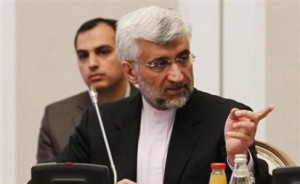 Is the Obama administration capable of fulfilling Iran�s demand for removing unilateral American sanctions, thus paving the way for an agreement over its nuclear issue? Among a sea of sanctions that the UN Security Council, the EU and the US have imposed on Iran, the US sanctions that target its oil industry and banking system have been the most damaging. America's extensive range of sanctions threatens the countries and the companies who trade with Iran with penalties and with being cut off from the US market.
Is the Obama administration capable of fulfilling Iran�s demand for removing unilateral American sanctions, thus paving the way for an agreement over its nuclear issue? Among a sea of sanctions that the UN Security Council, the EU and the US have imposed on Iran, the US sanctions that target its oil industry and banking system have been the most damaging. America's extensive range of sanctions threatens the countries and the companies who trade with Iran with penalties and with being cut off from the US market.In the last round of talks in Almaty between Iran and the�P5+1�in early April, Iran put forth two demands as necessary conditions for reaching any agreement. These included recognition of Iran�s rights to peaceful nuclear technology and termination of international sanctions � obviously including the tough sanctions imposed by the US.
Congressional actions during President Obama's first term have limited the president's ability to provide sanctions relief. Previously flexible executive orders are now constrained. According to Andrew Parasiliti, editor and CEO of�Al-Monitor,�writing last year in the August-September 2012 issue of the IISS journal Survival, most sanctions on Iran can only be lifted by Congress after the president certifies that �Iran is no longer a state sponsor of terrorism; has ceased its efforts to acquire nuclear, biological, and chemical weapons and related missile delivery systems; and no longer poses a 'significant threat' to the United States and its allies."
It is worth noting here that US sanctions are not limited to Iran's�nuclear program. The sanctions laws applying to Iran's banking and oil industries are not subject to much if any presidential maneuver, either. In negotiating with Iran, the president must also consider negotiating with Congress.
Limited waivers that are within Obama�s authority are not what Iran expects or is looking for. This issue is of supreme importance. Iranians should realize that, during talks and negotiations with the P5+1, neither the US representative Wendy Sherman nor any other official above her in the administration has the authority to remove sanctions.
The US government views Iran�s support of and its relationship with Hezbollah, Hamas and Islamic Jihad, which is unmistakably played up by the Iranian leadership, as sponsorship of terrorism. Given the ideological structure of the Iranian government, this current trend is unlikely to change. Meanwhile, the human rights issues have persistently been�an element of tension between the two governments since the Iranian revolution, while the perception of the two sides on the issue of human rights originates from incompatible worldviews.
On the other hand, change or suspension of sanctions laws, which is almost exclusively under the control of the US Congress, seems almost impossible given the anti-Iran climate that dominates in Congress � at least for the time being. Even if we ignore Congress� negative sentiment toward the Iranian government and the influence of the Israeli lobby in Congress, modifying or repealing a law in Congress has never been easy.
The above issues effectively undermine the US approach of passing crippling sanctions laws with the intent of bringing the Iranians to the negotiating table and striking a deal with them.
Disregarding the fact that the Obama administration could not � even if it wanted to � lift all sanctions, the insistence by Tehran on the removal of all sanctions only paves the way for failure in the talks, further intensification of sanctions and, potentially, a destructive military conflict. Therefore, it is vital that Iranians engage in direct dialogue with the US to understand the facts surrounding their unilateral sanctions. By adopting a realistic policy and directly talking with the US government, Iranians can familiarize themselves with the limitations around the removal of sanctions and organize their demands based on realities.
The situation might be better today if in the last several years a more realistic school of thought had been managing Iran�s foreign policy instead of making a mockery of the world by calling the sanctions �a torn piece of paper.� Iran�s June 14 presidential election is an opportunity for a more realistic and pragmatic government to take the helm.
By Al-Monitor
The Iran Project is not responsible for the content of quoted articles.










